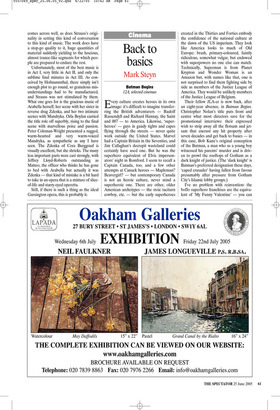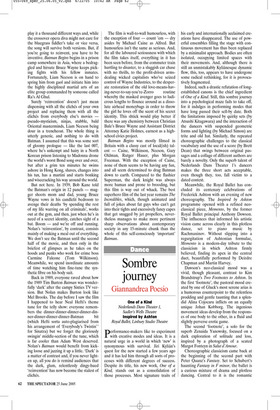Back to basics
Mark Steyn
Batman Begins 12A, selected cinemas Every culture creates heroes in its own image: it’s difficult to imagine transferring the British adventurers — Rudolf Rassendyll and Richard Hannay, the Saint and 007 — to America. Likewise, ‘superheroes’ — guys in gaudy tights and capes flying through the streets — never quite work outside the United States. Marvel had a Captain Britain in the Seventies, and Jim Callaghan’s decrepit wasteland could certainly have used one. But he was the superhero equivalent of Elvis impersonators’ night in Romford. I seem to recall a Captain Canada, too, and a few other attempts at Canuck heroes — Mapleman? Beavergirl? — but contemporary Canada is not an heroic culture, never mind a superheroic one. There are other, older American archetypes — the stoic taciturn cowboy, etc. — but the early superheroes created in the Thirties and Forties embody the confidence of the national culture at the dawn of the US imperium. They look like America looks to much of Old Europe: brash, primary-coloured, faintly ridiculous, somewhat vulgar, but endowed with superpowers no one else can match. Technically, Superman is from Planet Krypton and Wonder Woman is an Amazon but, with names like that, one is not surprised to find them fighting side by side as members of the Justice League of America. They would be unlikely members of the Justice League of Belgium.
Their fellow JLA-er is now back, after an eight-year absence, in Batman Begins. Christopher Nolan’s title puts front and centre what most directors save for the promotional interviews: their expressed wish to strip away all the flotsam and jetsam that encrust any hit property after seven decades and get back to basics — in this case, Bob Kane’s original conception of the Batman, a man who as a young boy witnessed his parents’ murder and is driven to prowl the rooftops of Gotham as a dark knight of justice. (The ‘dark knight’ is Batman’s preferred designation these days, ‘caped crusader’ having fallen from favour presumably after pressure from Gotham City’s Islamic lobby groups.) I’ve no problem with reinvention: the boffo superhero franchises are the equivalent of ‘My Funny Valentine’ — you can play it a thousand different ways and, while the crossover opera diva might not care for the bluegrass fiddler’s take or vice versa, the song will survive both versions. But, if you’re going to reinvent, you have to be inventive. Batman Begins begins in a prison camp somewhere in Asia, where a bedraggled and hirsute Bruce Wayne keeps picking fights with his fellow inmates. Fortunately, Liam Neeson is on hand to spring him from gaol and initiate him into the highly disciplined martial arts of an elite group commanded by someone called Ra’s Al Ghul.
Surely ‘reinvention’ doesn’t just mean dispensing with all the clichés of your own project and replacing them with all the clichés from everybody else’s movies pseudo-mysticism, ninjas, stubble, bald Oriental masterminds, Liam Neeson being dour in a trenchcoat. The whole thing is utterly generic, and nothing to do with Batman. I assumed that this was some sort of gloomy prologue — like the last 007, where he’s unkempt and hairy in a North Korean prison listening to Madonna drone the world’s worst Bond song over and over, but after a grim ten minutes he swims ashore in Hong Kong, shaves, changes into his tux, has a martini and starts bonking and wisecracking his way around the world.
But not here. In 1939, Bob Kane told the Batman’s origin in 12 panels — mugger shoots mom and dad, young Bruce Wayne vows in his candlelit bedroom to avenge their deaths ‘by spending the rest of my life warring on all criminals’, works out at the gym, and then, just when he’s in need of a secret identity, catches sight of a bat. Boom — and we’re off and running. Nolan’s ‘reinvention’, by contrast, consists mainly of making a meal out of everything. We don’t see the Batman until the second half of the movie, and then only in the briefest of glimpses as he takes on the hoods and punks who work for crime boss Carmine Falcone (Tom Wilkinson). Meanwhile, we spend inordinate amounts of time watching him fine-tune the synthetic fibre on his body suit.
Back in 1989, everyone raved about how the 1989 Tim Burton Batman was wonderfully ‘dark’ after the campy Sixties TV version. But Nolan makes Burton look like Mel Brooks. The day before I saw the film I happened to hear Neal Hefti’s theme tune for the telly show: everyone remembers the dinner-dinner-dinner-dinner-din ner-dinner-dinner-dinner-Batman bit (which Hefti sorta auto-plagiarised from his arrangement of ‘Everybody’s Twistin” for Sinatra) but we forget the gloriously swingin’ middle-section of the tune, which is far cooler than Adam West deserved. Nolan’s Batman would benefit from kicking loose and jazzing it up a little. ‘Dark’ is a matter of contrast and, if you never lighten up, all you do is remind audiences that the dark, glum, relentlessly dingy-hued ‘reinvention’ has now become the stalest of clichés. The film is wall-to-wall humourless, with the exception of four — count ’em — dry asides by Michael Caine as Alfred. But humourless isn’t the same as serious. And, for all the laboured seriousness with which the film takes itself, everything in it has been seen before, from the commuter train hurtling to disaster, to a sluggish car chase with no thrills, to the profit-driven armsdealing wicked capitalists who’ve seized control of Wayne Industries, to the desperate restoration of the old love-means-hav ing-never-to-say-you’re-Zorro routine whereby the masked avenger goes to ludicrous lengths to flounce around as a dissolute airhead moneybags in order to throw the girl he loves off the scent of his secret identity. This shtick would play better if there was any chemistry between Christian Bale’s Bruce Wayne and Assistant District Attorney Katie Holmes, earnest as a highschool civics project.
Batman Begins was mostly filmed in Britain with a classy cast of local(ish) talent — Caine, Wilkinson, Neeson, Gary Oldman, Rutger Hauer, plus Morgan Freeman. With the exception of Caine, none of them seems to be having any fun, and all seem determined to drag Batman down to earth. Compared to the flashier Superman, the dark knight was always more human and prone to brooding, but this film is way out of whack. The best superhero film of the last year remains The Incredibles, which, though animated and full of jokes about fat guys who can’t get into their tights and excessively fancy capes that get snagged by jet propellers, nevertheless manages to make more pertinent sharp observations about contemporary society in any 15-minute chunk than the whole of this self-consciously ‘important’ Batman.



































































 Previous page
Previous page